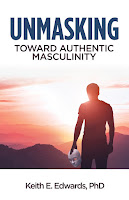Unmasking... referenced bell hooks', The Will to Change, which caused me to read it as well, although after reading Keith's book. hooks provided important philosophical background that Keith characterized by saying, "For many centuries and millennia, men as a group, often with many other dominant identities, have been controlling and utilizing political power, scientific discoveries, business development, and more for their benefit" (p. 9). While these systemic conditions have benefited men, "the same patriarchal system granting men these privileges also harms men through the gender expectations it places on them" (p. 10). The purpose and process of Keith's research was to listen and to give his subjects, and men who are reading his book, permission to explore who they were expected to be in comparison to who they really are or wanted to be.
Germain to, and confirmation of, my life experience is that masking has been enforced over time as a way of protecting male privilege while simultaneously putting men in a strait jacket of expectation. Men either conform, uncomfortably accommodate, or resist the masculine images that they hardly notice - unnoticed because the messages are like the air we breathe. Men who conform either naturally or uncomfortably project what they believe are masculine images of dominance in presence and presentation, often including "Breaking the rules... by showing independence from social norms, irreverence for authority, and indifference to the impact on others" (p. 72). Conforming to a rule breaking and uncaring image can be seen in behavior patterns from elementary school on through higher education, contributing to boys and men achieving less in studies and in fact being represented in lower proportion to women by the time they could be entering college. Even in the cases where boys and men do things outside the typical masculine image (e.g., playing piano or violin, painting, dancing, or cooking), the only way to escape derision is to excel in competitive ways, beating one's peers.
Conformity to masculine stereotypes results in harm to others and to self, including oppression of women, hierarchies of masculinity, relationship avoidance, and a general lack of well-being. Perhaps one of the most tragic consequences of masking is what Keith terms as "manestesia," the inability for men to share with and be vulnerable even with good friends. Keith offers numerous insights on identity development, intersectional identities, and the costs and benefits of unmasking. He also offers a way out of masking and moving toward openness to authentic being, which include focusing on the success strategies of 1. Well-being, 2, Strengths, 3. Be grateful, 4. Practice mindfulness and meditation, 5. Be kind, and 6. Foster relationships. Keith's admission that "I am harshest with men who remind me of previous versions of myself..." through "blaming and shaming" (p. 162) was particularly helpful because behind these judgments is the desire to be the good male who doesn't hurt himself or others. The lesson is that standing apart in judgment does little to invite other men into unmasking with you.
For an introduction to Edward's Unmasking, see his interview on Student Affairs Now. Sudent affairs staff are essential to help male students explore issues of identity, especially since enrollment and retention among men has declined in recent years.

No comments:
Post a Comment